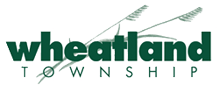Stormwater Management
The Highway Commissioner/Road District is responsible for maintenance of roads in the road district. Roadside ditches play a vital role. They prevent unsafe accumulations of stormwater on the roadway surface. They drain water away from the roadway. They reduce flooding resulting from a heavy rainfall. They help maintain healthy water quality in receiving streams and if constructed and maintained reduce infrastructure costs caused by inadequate road base drainage.
Clean water is everyone’s business.
All the roads and ditches the Township maintains are connected to larger water systems. Did you know that most of the stormwater runoff from rain or snowmelt flows over our roadways, driveways, sidewalks and ends up in the DuPage River.
Given that interconnection, Wheatland Township maintains a MS4 permit.
What’s is a MS4 permit?
MS4 is short for municipal separate storm sewer system. Storm systems collect mostly rainwater and is separate from the sanitary sewer system.
The permit is from the Illinois EPA and requires Wheatland Township to implement a stormwater management program with six minimum control measures and special conditions to be included in the program. These six minimum control measures are as follows:
- Public Education & Outreach: The public education and outreach consists of measures and programs to educate the public about the impacts of stormwater discharges to receiving waterways and management practices to reduce pollution in stormwater.
- Public Involvement/Participation: The public involvement and/or participation consists of meetings, resources, and events to promote the public participation in environmental programs.
- Illicit Discharge Detection and Elimination: The illicit discharge detection and elimination consists of developing, implementing, and enforcing a program to detect and eliminate stormwater pollution.
- Construction Site Storm Water Runoff Control: The construction site storm water runoff control measure consists of developing, implementing, and enforcing a program to reduce pollutants in storm water runoff from construction activities with 1 acre or more of disturbance.
- Post-construction storm water management in new development and redevelopment: The post-construction storm water management measure consists of activities to reduce pollutants in storm water runoff, including best management practices and maintenance.
- Pollution Prevention/Good Housekeeping for Municipal Operations: Pollution prevention and/or good housekeeping measures consist of educating and training Skyway staff to prevent and reduce stormwater pollution from Skyway owned operations.
How is Wheatland Township managing stormwater?
The Township developed a stormwater management program to reduce pollutant impacts in stormwater runoff. The MS4 permit required monitoring, record keeping, and reporting documents consists of the following:
- Notice of Intent (NOI)–NOI is available to the public by IEPA or click on the contact to request a copy.
- Storm Water Pollution Prevention Plan (SWPPP)-SWPPP is available to the public by IEPA or contact to request a copy.
- Salt Usage-Yearly salt usage during the winter months is available in the SWPPP or contact to receive a copy.
- Storm Water Management Plan (SWMP)
- Annual Report
- Monitoring–Monitoring results are included in the annual reports, in accordance with the latest permit requirements.
- Annual Training–Training of Township employees on storm water management is conducted annually. The 2022 training was completed in October.
In a continual effort to improve the way the Township manages the reduction of pollutant impacts in stormwater runoff, we encourage public involvement and comments on the above information. Please direct all comments to [email protected].
How is the Township managing chlorides?
In the Chicago region, elevated chloride concentrations in receiving streams during the winter season is primarily due to road salt. Implementing control measures is important to reduce chlorides discharged into receiving waterbodies. The Township’s commitment to proper management of chlorides includes the following activities:
Participation/provide literature Smart Smart https://saltsmart.org/
Salt storage-The Township has a permanent enclosed storage structure for the salt (a Salt Dome).
Tracking Salt Usage-The Skyway tracks average annual salt usage for de-icing purposes per calendar year.
Other related links:
Map of Effective Water Quality Standard of CAWs area (pdf)
Protecting Water Quality (pdf)
As a Resident, how can I help?
As a resident, you can play an active and vital role in stormwater management in your area. Below are 10 things you can do to prevent stormwater runoff pollution (United States Environmental Protection Agency)
Use fertilizers sparingly and sweep up driveways, sidewalks, and gutters
Never dump anything down storm drains or in streams
Vegetate bare spots in your yard
Compost your yard waste
Use least toxic pesticides, follow labels, and learn how to prevent pest problems
Direct downspouts away from paved surfaces; consider starting a rain garden
Take your car to the car wash instead of washing it in the driveway
Check your car for leaks and recycle your motor oil
Pick up after your pet
Have your septic tank pumped and system inspected regularly
Homeowner’s guide to Septic System (pdf)
Other Related Links:
Interactive Water Cycle (K-12) (pdf)
NPS Urban Facts from EPA (pdf)
After the storm from EPA (pdf)
2023 MS4 Notice of Intent (pdf)
Illinois Environmental Protection Agency (pdf) (pdf might not display properly within some browser pdf readers. Download pdf to view properly)
LITERATURE
Protecting Water Quality (pdf)
Homeowner’s guide to Septic System (pdf)
